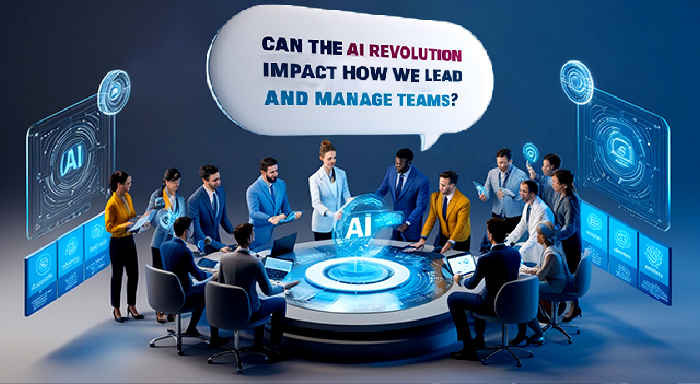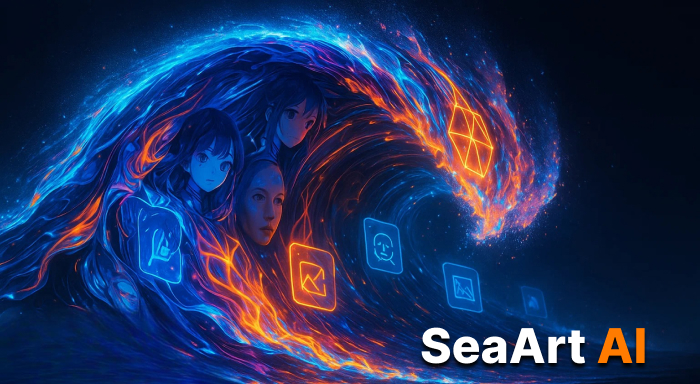As the Artificial Intelligence revolution continues to evolve and become a staple of businesses, it’s a given that leaders who fail to get on board might risk being left behind.
As per the 2024 McKinsey Global Survey on AI, 65% of respondents have said that their organizations are now regularly using generative AI. This figure is nearly twice as high as the percentage reported in another McKinsey survey just ten months ago.
The adoption of AI in the industries has been rapid and widespread. Does it truly impact the businesses as experts believe? Well, it’s worthwhile to discuss whether the AI revolutions can impact leadership and management operations on a daily basis. We know that AI-powered HR Software is showing a new way modern companies can manage payroll and onboarding. However, what more can the AI do for the business?
In this write-up, let us deep-dive further into this relevant topic and look at how the AI revolution is changing the management of different business domains. We will look at how the AI revolution is impacting employee engagement, communication, decision-making, project management, etc.
AI Revolution and Employee Engagement
Engaging employees remains one of the biggest priorities of any organization. They need constant new working modes and human connection to feel connected to the workplace. Despite organizations investing in employee engagement, a Gartner research show that nearly 70% of employees don’t feel as engaged as they should be.
AI revolutions can help organizations gain deep insights into their employees. Through AI-powered data analytics, understanding behavior of employees has become easier. AI tools also allow companies to know employee’s strengths, weaknesses, passions, and needs.
Artificial Intelligence leverages behavioral science to deeply explore areas like versioning, simulating dialogues, and creating appropriate analogies. Managers and leaders can utilize these insights to form deeper connections with their team members and create a positive impact on them. Result? A vibrant organizational environment where everyone feels valued and motivated.
Moreover, business leaders can also explore generative AI to enhance employee growth. Generative AI can be used to inspire creativity and innovation and open up endless opportunities of learning and personality development. AI makes it easier for both the employees and leaders to collaborate on customized growth plans. AI can recommend personalized plans, skills employees can develop, classes they can enroll in, and how they can improve their networking.
Combined with traditional, rules-based AI, this approach can bring leaders and their team members on the same page with the right opportunities based on skills and organizational needs. This paves the way for more meaningful work and motivates teams in the process.
AI Revolution and Communication
Digital connectivity has made team communication both more flexible as well as more challenging. With sentiment analysis and natural language processing, generative AI can handle this issue in the workplace by analyzing team members’ communication preferences. It can then offer unique insights and personalized suggestions to leaders to drive more effective engagement. AI can help leaders improve their way of communication whether through in-person or via collaborative platforms.
AI has helped companies create a more inclusive workplace and has changed the way team members communicate with one another. While it’s true that AI cannot replace human empathy and reasoning, it can still facilitate communication, enhance efficiency, and manage a diverse range of communication forums.
Just as chatbots lack human empathy, but they can ensure easy customer interactions, AI can work in the same way. AI can be helpful in moderating group discussions and ensuring that all the voices are heard. By prioritizing inclusivity, the AI revolution can create more balanced and healthy dialogue, empathy, and mutual understanding.
What’s more, AI in no way replaces human interaction. It instead amplifies a leader’s ability to manage open communication forums and gather insights to ensure the inclusivity efforts resonate well with the team.
AI Revolution and Decision-Making
AI, particularly Generative AI, goes beyond just boosting team dynamics. It helps organizations make data-driven and strategic business decisions by offering insights and suggestions after analyzing large datasets. This capability helps leaders make more informed, data-driven decisions, sometimes even predicting future trends.
In fact, more than 40% CEOs across the globe already report using Gen AI to guide their decision-making processes. This is quite understandable because the AI revolution has made sure that business leaders have access to valuable insights related to employees, customers, market trends, and competitor analysis. These insights allow leaders to be more attentive, proactive, and strategic in their approach. It guides businesses toward making decisions backed by data rather than trusting their intuition and sentiments. Thus, it puts companies in pole position to attain competitive advantage and revenue.
In the modern world, the way AI has impacted several industries and taken decision-making to the next level is for everyone to see. For example, in the retail industry, AI can allow organizations to track supply chains, inventory, purchasing patterns, and customer feedback easily. This allows business owners to get real-time data on their fingertips and improve their processes based on insights. For instance, AI can offer suggestions like shifting a popular product to a certain market or making certain adjustments to a marketing campaign that is underperforming. Leaders who have such real-time data can easily lead their business toward growth effectively.
AI Revolution and Productivity
AI’s ability to automate routine and repetitive tasks makes it a very useful tool for managers. It allows businesses to push their productivity and efficiency to the next level.
Managers often spend a huge amount of time on tasks like data entry, report generation, and scheduling that don’t require their full attention. AI-powered software can automate these mundane activities, in turn, freeing up managers to focus on more strategic initiatives.
Imagine a manager no longer needing to spend hours inputting data into spreadsheets. With the AI revolution, data entry is automated. It allows managers to focus more on interpreting and analyzing the data as well as making effective decisions. And if studies are anything to go by, like this Accenture one, a whopping 90% of businesses are already leveraging Gen AI to boost productivity.
AI Revolution and Project Management
Complex project management calls for thorough coordination, planning and resource allocation. AI helps managers streamline these areas, simplify project execution and improve their chances of success. Giving project data as input enables AL algorithms to detect any possible bottlenecks and roadblocks. It helps managers to understand issues proactively and prepare strategies to tackle these challenges. Plus, AI suggests optimal resource allocation based on historical data and project requirements so that the right people are assigned to the right tasks at the right time.
AI-driven tools for project management also entail features for regular notifications and updates. It is an effective way of keeping managers informed about certain milestones and progress. Real-time updates also allow managers to make decisions on time, ensure adjustments, and minimize delays while improving efficiency.
AI Revolution and Time Management
Effective time management is essential for maximizing productivity. Courtesy of the AI revolution, organizations have got tools that can help in ensuring effective time management. Such tools help businesses figure out how time is being utilized in the organizations and get useful recommendations to improve their workflows.
Machine learning algorithms can observe a manager’s daily activities and identify time-wasting patterns. For instance, if too much time is spent on unproductive meetings, AI can suggest alternatives like virtual meetings or email communication to achieve the same goals.
AI tools help leaders manage their workflows well by prioritizing tasks. Through assessing dependencies, deadlines, and work patterns, AI makes sure that time and resources are utilized well. Managers can also work on their schedule using a reliable AI tool to make sure that they are managing time well. This way managers can spend their time on more critical tasks and complete them on schedule while minimizing non-essential activities.
AI Revolution and Team Management
In remote or hybrid work environments that are common across industries today, effectively managing teams can be a challenging task. AI tools make it easy for the managers to smoothly manage collaboration and communication among remote teams. Powerful AI tools include features like virtual meeting assistants, interface for virtual team-building activities, and automated progress tracking.
Another aspect where the AI revolution has created an impact is tracking of employee performance and offering relevant feedback. AI-driven performance monitoring tools keep track of important metrics and give managers essential insights. This helps managers get timely feedback, recognize needs for training, and support employee development and growth more effectively.
Can Managers Deal with AI Challenges While Spearheading Teams?
In today’s fast-moving work environment, the presence of AI has opened up a world of opportunities and allowed managers to thrive. By understanding AI basics and its diverse applications, managers can leverage AI tools to make tactical decisions to improve performance, enhance efficiency, and upgrade engagement of employees.
However, you must be careful while depending too much on the AI tools. They come with their own challenges that managers need to understand for effective implementation.
Striking a Balance Between AI and Human Touch
As we saw above, the AI revolution offers a number of benefits to leaders, completely changing the way teams are led and managed. Nevertheless, it is important to recognize that human insights still cannot be replaced by an AI tool.
AI is more than capable for analyzing numbers and offering actionable insights, but it lacks human perspective. It does not have an ability to build relationships, read emotions, and make choices driven by ethics. It is important for business leaders to only depend on AI for boosting management skills and decision-making. They must rely on their own logic, knowledge, and emotional intelligence to guide their teams effectively.
Steering Through AI Ethics and Privacy Concerns
As AI technologies advance, ethical issues and potential biases are bound to arise. However, for businesses, there cannot be any compromise on ethics and transparency. Managers using AI tools must make sure that their AI systems are transparent, fair, and adhere to privacy policies. It is important for them to establish clear guidelines that govern the use of AI. This is important to ensure protection of both employees and customers.
Integrating AI Seamlessly into Existing Systems
Integrating AI into current managerial systems can be complex. It must be the duty of managers to carefully assess the integration process and ensure seamless transition Overall, making sure that there are no disruptions and downtime is essential. Essentially, this implies that managers must work closely with IT professionals and ensure adequate training and support. Employees must not take too much time to get comfortable with these AI technologies.
Key Takeaways
AI has revolutionized the way managers handle their teams. It is quite clear that the AI has indeed transformed the way teams work and get managed. Equipping managers with powerful tools allow managers to improve their management practices, improve their decision making, and restructure their workflows. As AI continues to evolve, managers must embrace its impact and upgrade in order to compete effectively in the changing ecosystem.
AI technologies enable managers to become more effective and proficient leaders in an AI-driven market. AI tools help managers improve their workflows and keep them informed at every step of the way. Once managers learn to embrace AI’s impact and handle challenges responsibly, they can lead their teams toward a future where growth and innovation lead the way. Afterall, in the modern AI-driven world, effective leadership is not limited to managing people—it is about bringing change and driving innovation!



